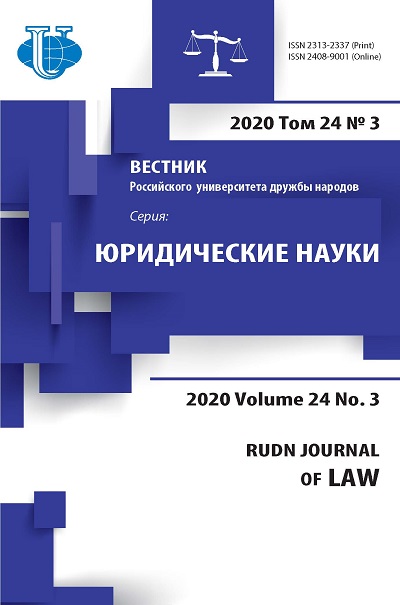ОБЪЕКТ НАЛОГООБЛОЖЕНИЯ В УСЛОВИЯХ ЦИФРОВИЗАЦИИ
- Авторы: Лютова О.И.1
-
Учреждения:
- Национальный исследовательский университет «Высшая школа экономики»
- Выпуск: Том 24, № 3 (2020)
- Страницы: 695-716
- Раздел: АДМИНИСТРАТИВНОЕ И ФИНАНСОВОЕ ПРАВО
- URL: https://journals.rudn.ru/law/article/view/24568
- DOI: https://doi.org/10.22363/2313-2337-2020-24-3-695-716
- ID: 24568
Цитировать
Полный текст
Аннотация
Статья посвящена проблеме изменения содержания понятия объекта налогообложения в российской науке налогового права в условиях взятого курса на цифровую экономику. Цель статьи - провести анализ положений российского налогового законодательства, международных норм, а также академической литературы по вопросу идентификации тех или иных новых предметов и явлений в качестве возможных объектов налогообложения, тем самым актуализировав понятие самого объекта налогообложения. Развитие информационных технологий порождает следующие неизбежные проблемы, связанные с содержанием понятия объекта налогообложения, что позволяет возродить дискуссию о содержании этого налогово-правового понятия: невозможность оценки реализационных операций в качестве потенциальных объектов налогообложения с помощью классической триады «товар, работа, услуга»; признание в отдельных ситуациях (например, при расчете электронными деньгами) в качестве объекта налогообложения ни одного, а совокупности юридических фактов (юридического состава); необходимость установления объекта налогообложения через так называемую «налогообразующую связь» предмета и субъекта налога. В связи с возникновением первой проблемы автор предлагает однозначно определить в НК РФ правовую природу реализационных операций цифровых продуктов для целей налогообложения, отнеся их к новому виду услуг. Вывод основывается на опыте международного регулирования и предполагает дополнения положений НК РФ в части правового регулирования понятия объекта налогообложения, а также налогообложения НДС. Исследование второй проблемы позволяет сделать вывод о необходимости уточнения нормы НК РФ при осуществлении контрагентами налогооблагаемых операций, расчеты по которым производятся с использованием электронных денег. В этом случае объектом налогообложения является не один, а несколько юридических фактов-действий потенциального налогоплательщика. По третьей проблеме автор предлагает обсудить вопросы идентификации налогоплательщика в случае удостоверения им налогооблагаемой сделки аналогом цифровой подписи. С учетом международного опыта, а также национального гражданско-правового регулирования сделан вывод о необходимости включения в налоговое законодательство положений о цифровых свидетельствах и цифровых подписях.
Об авторах
Ольга Игоревна Лютова
Национальный исследовательский университет «Высшая школа экономики»
Автор, ответственный за переписку.
Email: olyutova@hse.ru
кандидат юридических наук, научный сотрудник Института государственного и муниципального управления
101000, г. Москва, Российская Федерация, ул. Мясницкая, д. 11Список литературы
- Андреев Н.Ю. Налоговый суверенитет и цифровая экономика: цифровое постоянное представительство // Финансовое право. 2018. № 12. С. 13-16
- Беликов Е.Г. Тенденции социально и инновационно направленного развития налогового законодательства в условиях цифровой экономики // Налоги. 2019. № 4. С. 23-26
- Цифровое право: учебник / под общ. ред. В.В. Блажеева, М.А. Егоровой. Москва: Проспект, 2020. 640 с
- Букач Е. Основные направления международного налогообложения в ЕАЭС [Интервью с Н.Т. Мамбеталиевым] // Налоговый вестник - Консультации. Разъяснения. Мнения. 2017. № 9. С. 10-16
- Cesarano, F. (2008) Money and monetary systems. Cambridge University Press
- Чуркин А.В. Понятие объекта налогообложения и проблемы его определения в законодательстве: Автореф. дис. ... канд. юрид. наук. М. 2002. 26 с
- Гришина О.П. Оплата покупателем услуг связи через электронный кошелек // Услуги связи: бухгалтерский учет и налогообложение. 2019. № 1. С. 21-27
- Hampton, S. (2016) Undermining Bitcoin. Washington Journal of Law. Technology & Arts. Vol. 11, Iss. 4. 331-334
- Ивлиева М.Ф. К понятию налога и объекта налогообложения // Вестник МГУ. Серия 11. Право. 1997. № 3. С. 37-39
- Kadar, M. (2015) European Union competition law in the digital era. Zeitschrift fur Wettbewerbsrecht. No. 4. 342-368
- Карагусова Г. Налоги: сущность и практика использования. Алматы: Экономика. 1994. 47 с
- Королева Л.П. Налогообложение цифровых услуг: вопросы теории, зарубежной практики и отечественных предпосылок // Экономические и социальные перемены: факты, тенденции, прогноз. 2019. Т. 12. № 3. С. 91-106
- Хабриева Т.Я. Право перед вызовами цифровой реальности // Журнал российского права. 2018. № 9. С. 5-16
- Хаванова И.А. Налоговая юрисдикция: новое прочтение // Финансовое право. 2017. № 5. С. 34-38
- Кучеров И.И. Значение предмета и источника налогообложения для юридической конструкции налога // Финансовое право. 2009. № 5. С. 2-5
- Кучерявенко Н.П. Объект налогового правоотношения и объект налогообложения: содержание и соотношение понятий // Финансовое право. 2003. № 3. С. 11-13
- Lambooij, M. (2014) Retailers Directly Accepting Bitcoins: Tricky Tax Issues? Finance and Capital Markets (formerly Derivatives & Financial Instruments), Volume 16, No 3. 138-144
- Лютова О.И. Налоговая правосубъектность участников рынка криптовалют: новые подходы // Налоги-журнал. 2019. № 2. С. 40-42
- Matsuura, J.H. (2016) Digital Currency: An International Legal and Regulatory Compliance Guide. Bentham Science Publishers. doi: 10.2174/97816810822331160101
- Митин Д.А. Налогообложение электронной коммерции: российский и европейский опыт // Налоги. 2018. № 6. С. 36-39
- Пепеляев С.Г. Основы налогового права. М.: Юрист. 2001. 343 с
- Покровская Н.Н. Проблемы налогообложения инновационных бизнес-моделей в цифровой экономике // Экономика России в условиях ресурсных ограничений: сборник научных трудов по итогам научно-практической конференции молодых ученых Санкт-Петербургского государственного экономического университета. СПб: Издательство Санкт-Петербургского государственного университета, 2016. 559 с
- Порохов Е.В. Теория налоговых обязательств: Учебное пособие. Алматы: Жеты Жаргы. 2001. 168 с
- Савельев А.И. Криптовалюты в системе объектов гражданских прав // Закон. 2017. № 8. С. 136-153
- Shaviro, D. (2014) The Economics of Tax Law. New York University Public Law and Legal Theory Working Papers
- Финансовое право в условиях развития цифровой экономики: монография / К.Т. Анисина, Б.Г. Бадмаев, И.В. Бит-Шабо и др.; под ред. И.А. Цинделиани. М.: Проспект, 2019. 320 с
- Напсо М.Д., Напсо М.Б. X Пермский конгресс ученых-юристов «Современная экономика в юридическом измерении» (статья редакционная) // Lex russica. 2019. № 12. С. 152-165
- Yermak, D. (2013) Is a Bitcoin a Real Currency? An Economic appraisal. NBER Working papers series. Cambridge, 2013, available at: http://www.nber.org/papers/w19747.pdf
- Wiseman, S.A. (2016) Property or Currency? The Tax Dilemma behind Bitcoin. Utah Law Review. (2). 417-440
Дополнительные файлы















